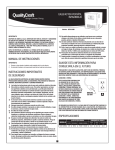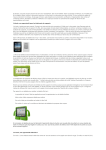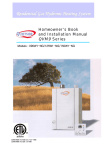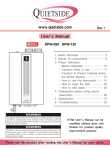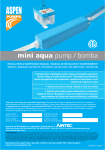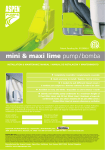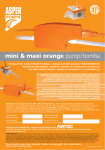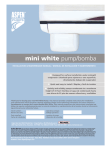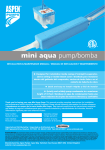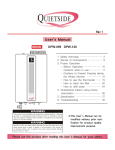Download Quietside QSCC-093 Operating instructions
Transcript
CHG-IOM-001 MAR-06 Installation and Maintenance Manual Report all Shipping Damage to Carrier IMMEDIATELY, Check units and box exterior for damage Note to Installer This manual to is to aid the qualified HVAC contractor in the Installation and Maintenance of this Quietside R410a Ductless Mini Split Please read and understand these instructions prior to installing the unit, failure to comply with these instructions may result in improper installation, operation and maintenance, possibly resulting in fire, electrical shock, property damage, personal injury or death Installers please retain this manual for future reference, please pass warranty registration to end user If Technical Assistance is required during installation or start up, please visit our website at www.quietside.com or call 1-562-699-6066 or 717 243 2535 to speak to a Technical Service Assistant When calling please have the Model numbers and Serial numbers available Safety Instructions Read all the Instructions, Install and apply the system per those instructions Use the unit only in the manner described in this manual 1 Check Rating Plate for correct system voltage before installing the unit Installing and operating a unit with the incorrect voltage may result in malfunction or other issues and will void the warranty 2 Units must be connected to a correctly grounded Electrical Supply 3 Do not use the units if they have been dropped or otherwise damage or installed incorrectly The manufacturer of the unit will not be liable for any damages caused by failure to comply with the installation and operating instructions in this manual The unit Rating Plate contains pertinent information to the unit operation, please refer to it as required This symbol is an indication of Important Safety Information Completely read all Instructions prior to assembling installing, operating, or working on these units Inspect all parts for damage prior to installation and start up Units must be installed by a Qualified HVAC Contractor Installation and Maintenance Manual Installer Supplied Items Refrigerant Line Set : Flare Connection only, suitable for R410A with both lines insulated, max length 45ft Main System Breaker : Sized per unit requirements, to be mounted adjacent to Outdoor unit High Voltage Interconnect Wiring : 14 AWG wiring from Outdoor unit to Indoor unit for Power and Control Mounting Hardware : Wall Anchors, Condenser Pad etc Refrigerant : R410A required for additional line set charge Condensate Piping : Per local codes to remove condensate from the indoor unit Items for Consideration Application Check the application of the unit prior to installation, certain applications require additional components or installation parameters Computer or Data Server Rooms, These require ballpark sizing of approximately 12,000 Btu/h Capacity per 250 SqFt of room size The units will be running 24/7, so a Low Ambient Head Pressure Controller (See accessories), a Crankcase Heater and possibly a Wind Baffle (Field Supplied for cooling below 32 DegF) must be installed Offices and Commercial Spaces, Churches etc These require ballpark sizing of approximately 12,000 Btu/h Capacity per 400 SqFt of room size The units could have the possibility of providing cooling with ambient's below 65 DegF, so a Low Ambient Head Pressure Controller (See accessories) is required as is a Crankcase Heater (field supplied) Residential, Bedrooms, Family Rooms etc These require ballpark sizing of approximately 12,000 Btu/h Capacity per 600 SqFt of room size Low Ambient is typically not needed, unless a home office application is required. Heat Pumps are a great application, however the units do not feature any back up resistance heat, so we do not recommend their use as a primary source of heat in areas where the winter temperatures fall below 25 DegF. Installation Determine the best location for mounting the Indoor unit, it must be located a minimum of 4 ft from the floor Pay attention to the air circulation in the room, 9 & 12k units throw air 15ft, 18 & 24k units throw air 25ft, ensure no obstacles to airflow exist Locate the Indoor and Outdoor units as close together as possible, maximum line set run and lift CANNOT BE EXCEEDED, then determine how the Interconnect piping, wiring and condensate hose is to be run Unit QSCE-09/12 QSCE-18/24 QSHE-09/12 QSHE-18/24 Max Line Set Run 50 Feet 50 Feet 50 Feet 50 Feet Max Vertical Lift 20 Feet 20 Feet 20 Feet 20 Feet Line Sizes 1/4" & 1/2" 3/8" & 5/8" 1/4" & 1/2" 3/8" & 5/8" Ensure that all panels can be removed for service as required Certification All Quietside Ductless Mini Splits are certified by UL under UL standard 1995 in both Canada and the US Performance is certified by our certification under the ARI 210/240 Program Installation and Maintenance Manual Controls and Components Units are supplied with a wireless remote controller, which communicates with the unit Microprocessor controller The return air temperature sensor mounted on the unit then controls the unit operation Several modes of operation are available to the end user depending on the type of comfort required All unit operating functions are controlled via the remote controller Unit operating modes are : Optional Controls and Components Low Ambient Controller : ICM 326H must be used in Data Room or Commercial applications For a wiring diagram please contact Quietside or follow general diagram supplied with ICM Controller Probe must be located in the fin pack or on a return bend that measures approx 100 DegF during normal operation Condensate Pump : Field Installed Mini Pump, Quietside recommend the Aspen brand of Condensate Pump, follow their wiring diagram recommendations. This pump is installed externally to the unit Unit Installation Follow Instructions, failure to follow instructions may cause possible malfunction and void any warranty Step 1 Remove Indoor and Outdoor units from the carton/box Indoor unit carton contains Remote Control and Batteries, ensure these are kept in a safe place during installation Step 2 Locate area to Install Indoor unit Indoor unit must be located a minimum of 4ft from the floor and 6" from the ceiling Choose an area where the wall is plumb and determine how to best to run the unit interconnects 4" from ceiling 8" from wall 8" from wall Indoor Unit Minimum 4ft from floor Optimum 6ft plus from floor Ensure no obstacles to Airflow are directly in front of the unit, for a minimum of 12ft for 9/12,000 Btu/h units and 16ft for 18/24,000 Btu/h units Do not install the Indoor unit units in areas exposed to high humidity (RH of 80% plus), direct sunlight and direct heat from stoves or other devices Installation and Maintenance Manual Unit Installation (Cont) Step3 Drill Hole for Line Set etc Remove mounting bracket from the rear of the Indoor unit, use a Phillips head screwdriver to remove the unit pipe strap, and if unit is a heat pump the defrost sensor also must be undone from its retainer. If mounting the unit on an outside wall measure from the edges of the unit to the center of the line set stub 90° bend to locate the the center of the wall penetration. Drill a ø 3" hole through the wall Angle the wall penetration slightly down towards the outside to assist in draining the condensate away from the unit If mounting the unit on an inside wall, use the knockouts provided on the LHS and RHS of the unit to route the piping and wiring connections through Step 4 Install Mounting Bracket Locate and secure the mounting bracket to the wall, the Indoor unit weighs a maximum of 20Lbs, use wall anchors and mount to a wall stud to ensure that the wall is capable of holding the weight of the unit Use a level to ensure mounting bracket is leveled, so condensate can drain properly Step 5 Prepare Unit Line Set Connections Rotate refrigerant line stubs set gently through 90° (if mounting on an outside wall), for other line set configurations align the stubs as required Tip : Use Duct tape to tape the Condensate hose (make sure it is below the Line set stubs) and the Defrost Sensor (Heat Pump Only), this makes it easier to guide them though the hole drilled in the wall Also if possible feed the 14 AWG Interconnect wiring between Indoor and Outdoor (Maximum # of wires required is 6) through the unit electrical connection (if required by local codes an electrical connector can be attached to the rear of the unit). Tape the loose wire to the line set stubs. These two tips save time and prevent damage to the stubs when mounting the Indoor unit Note : Condensate hose is taped below line set stubs Wrap Duct tape to the end of the condensate hose for easier installation Installation and Maintenance Manual Unit Installation (Cont) Step 6 Install unit on Mounting Bracket Feed the line set stubs/condensate hose/wiring connections through the ø 3" hole, then locate the unit key slots onto the tabs on top of the mounting bracket. Bottom of the unit then latches onto the mounting bracket. Indoor unit is now installed, it should be plumb, level and flush with the wall. If it is not check that the line set stubs are completely through the wall penetration, and also that the wall is plumb Step 7 Locate Outdoor unit Clearances for the Outdoor unit are : 6" Minimum Outdoor Unit 6" Minimum Front Condenser Fan Rear Service Valves 12" Minimum Install the Outdoor unit on a Condenser Pad or if a Heat Pump use feet to raise unit up approx 6" to allow for defrost to drain away 24" Minimum Do not install the Outdoor unit in a location exposed to high winds (field fabricated and installed wind baffle may be required). Ensure location does not impede access around unit and pose a disturbance to neighboring areas Step 8 Refrigerant Line Set Piping Interconnecting line set between the Outdoor unit and the Indoor unit, must have both refrigerant lines insulated as condensing device is located in the Outdoor unit Gently bend the line set stubs from the Indoor unit to the desired location Using 2 x 10"/12" Crescent wrenches remove the flare nuts from the Indoor unit line stubs. Unit is filled with a dry gas, check for release of this to ensure that no leaks are present Use a small amount of vacuum pump oil on the male flare threads to ease installation. Connect the line set to the stubs. Using the 2 wrenches, 1 on the male & 1 on the female tighten the flare nuts DO NOT INSTALL A LIQUID LINE SIGHT GLASS OR FILTER DRIER IN THE SYSTEM Run the line set to the Outdoor unit, avoid tight bends and kinking the lines. Quietside does not recommend brazing line sets together or to the unit connections If line set length is in excess of that required, cut line set and re-flare or coil excess vertically to facilitate oil return to the compressor Installing the Line Set on the Indoor unit stubs Line Set Connections under the GRAY caps Installation and Maintenance Manual Unit Installation (Cont) Step 9 Evacuation Gauges can now be attached to the service ports SERVICE PORTS HAVE A 5/16" CONNECTION TO GAUGES, WHICH IS DIFFERENT TO THE NORM Once the gauges are attached the line set can be leak checked using Nitrogen at 300 Psig Evacuate the unit down to a minimum of 200 Microns, break vacuum with Nitrogen to further leak check Re-evacuate the system down to 200 Microns or lower This is an R410A System it is essential that a deep vacuum be pulled on the system to remove all traces of moisture Step 10 Main Power Wiring Electrical Wiring should be done in accordance with all National Electrical Code (NEC) and local state/city building codes Tip : Small Electrical Screwdriver is required for unit terminals Breaker size and wiring must be sized for the rating plate amperage, MCA and MOP If a smaller than required breaker is used possibility of unit damage etc could occur Use only HACR type breakers, each system installed must have a separate branch circuit with an individual breaker/fuse Breaker Size RLA MCA QCIC-09 15A 6.7A 8.2A QCIC-12 15A 8.8A 10.8A QCIC-18 15A 5.3A 6.5A QCIC-24 20A 8.6A 10.6A Breaker Size RLA MCA QCIH-09 15A 6.9A 8.4A QCIH-12 15A 9.0A 11.0A QCIH-18 15A 5.5A 6.8A QCIH-24 20A 8.6A 10.6A A local disconnect should be installed adjacent to the Outdoor unit in accordance with National and Local Codes The Outdoor unit provides power for the Indoor unit, no disconnect is required between the Outdoor and Indoor units Line voltage from the disconnect should be wired to N - L (115V Unit) L1 - L2 (208/230V Unit) Remove RHS Knockout on the terminal access panel for whip/wiring connection Ground connection must be made to the terminal plate Tip : For easier access to the Terminals in the Outdoor unit remove the lower access panel to install whip and sealtite connectors for conduit Local Disconnect and Whip Connected Heat Pump unit terminals L1 - L2 : Power from Breaker L3 - L4 : Power to Indoor unit 1 - 2 - 3 : Control Signals Installation and Maintenance Manual Unit Installation (Cont) Step 11 Controls Wiring Electrical Wiring should be done in accordance with all National Electrical Code (NEC) and local state/city building codes ALL CONTROLS WIRING BETWEEN INDOOR AND OUTDOOR UNIT IS HIGH VOLTAGE MINIMUM 14 AWG WIRE MUST BE USED Remove terminal covers from Indoor unit and wire to the terminals, small electrical screwdriver required Control wiring from the Outdoor Unit must be a point to point i.e. the terminal that the wire is attached to on the Outdoor unit must be the same terminal it is wired to in on the Indoor unit This is extremely important : Switching the L3 - L4 or N1 - L1 wires over will allow the Indoor unit to operate but it will not provide controls signals for the Outdoor unit so that the compressor will not operate Ground connection should be made to ground screw marked in Indoor unit If unit is a Heat Pump Defrost Sensor must be connected from the Indoor unit to the Defrost Sensor in the Outdoor unit. Standard lead length is 25ft, if a longer length is required then cut the lead and extend using thermostat wire Control Wiring at Outdoor unit (Heat Pump unit shown) Note use of colored wire (supplied with Line Set) and defrost sensor connected (Heat Pump only) Ground wires connected to the terminal plate Indoor and Outdoor units must be grounded Step 12 Condensate Hose Unit is provided with approximately 18" of Condensate Hose Hose connection is sized to accept a 3/4" OD or 5/8" ID Clear Plastic Hose to then extend to building drain All condensate hose extensions should be in accordance with local building codes Remember water only flows downhill to ensure positive draining from the unit Check using water for a positive flow of Condensate The basic system installation is now complete The unit is now ready for start up Use this time to ensure that worksite is tidy. Quietside recommend the use of Slimduct products to hide the refrigerant line set interconnects - available from your Quietside distributor Installation and Maintenance Manual Unit Start Up With the refrigerant system completely evacuated the system can now be opened to allow the refrigerant charge in the Outdoor unit to be released into the line set The Service Valves require a 6mm and a 5mm Allen wrench respectively to undo the valve stems Remove the BRASS caps from the Service Valves Open the SUCTION line Valve first to prevent any possible oil logging of the Capillary tube This can occur if the liquid line valve is opened first with the rest of the system in a deep vacuum Then open the "LIQUID or EXPANDED GAS" line Open Suction Line Valve First Unscrew both valve stems until they come to a stop against the valve body, replace the Brass Caps and then tighten the caps to prevent leaks Energize the breaker to allow system to be powered Start Indoor unit, Cooling mode is only allowed when the Outside Ambient Temperature is above 65 DegF to prevent damage to the compressor Unit has a 3 minute time delay for the compressor start up operation Unit is charged with enough R410A refrigerant for a line set of 25ft length For longer line set lengths additional charge must be WEIGHED in per the following table Unit QCIC-09 & 12 QCIC-18 & 24 QCIH-09 & 12 QCIH-18 & 24 Added Charge required for a line set of 30ft 35ft 40ft 45ft 1.5oz 3.0oz 4.5oz 6.0oz 2.5oz 5.0oz 7.5oz 10.0oz 1.5oz 2.5oz 3.0oz 5.0oz 4.5oz 7.5oz Standard Operation of the unit - Cooling Indoor Temperature Split 30 DegF Suction Pressure 115 Psig, approx 37 DegF Suction Line Temperature 45 DegF Schraeder connection on the "Liquid" line DOES NOT READ HEAD PRESSURE - it is an expanded gas pressure Standard Operation of the unit - Heat Pump Indoor Temperature Split 30 DegF High Side Pressure 400 Psig, approx 117 DegF (Measured at Liquid Line Schraeder) Discharge (Liquid) Line Temperature 130 DegF 6.0oz 10.0oz Installation and Maintenance Manual Wiring Diagrams










